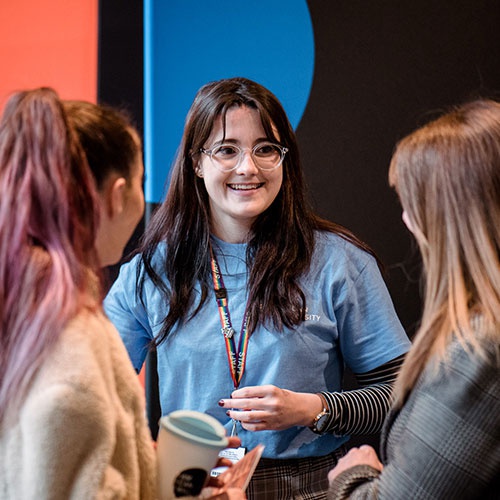Undergraduate Course
Journalism BA (Hons)
Tell important stories, gain studio and on-location experience, and prepare for your career in journalism.
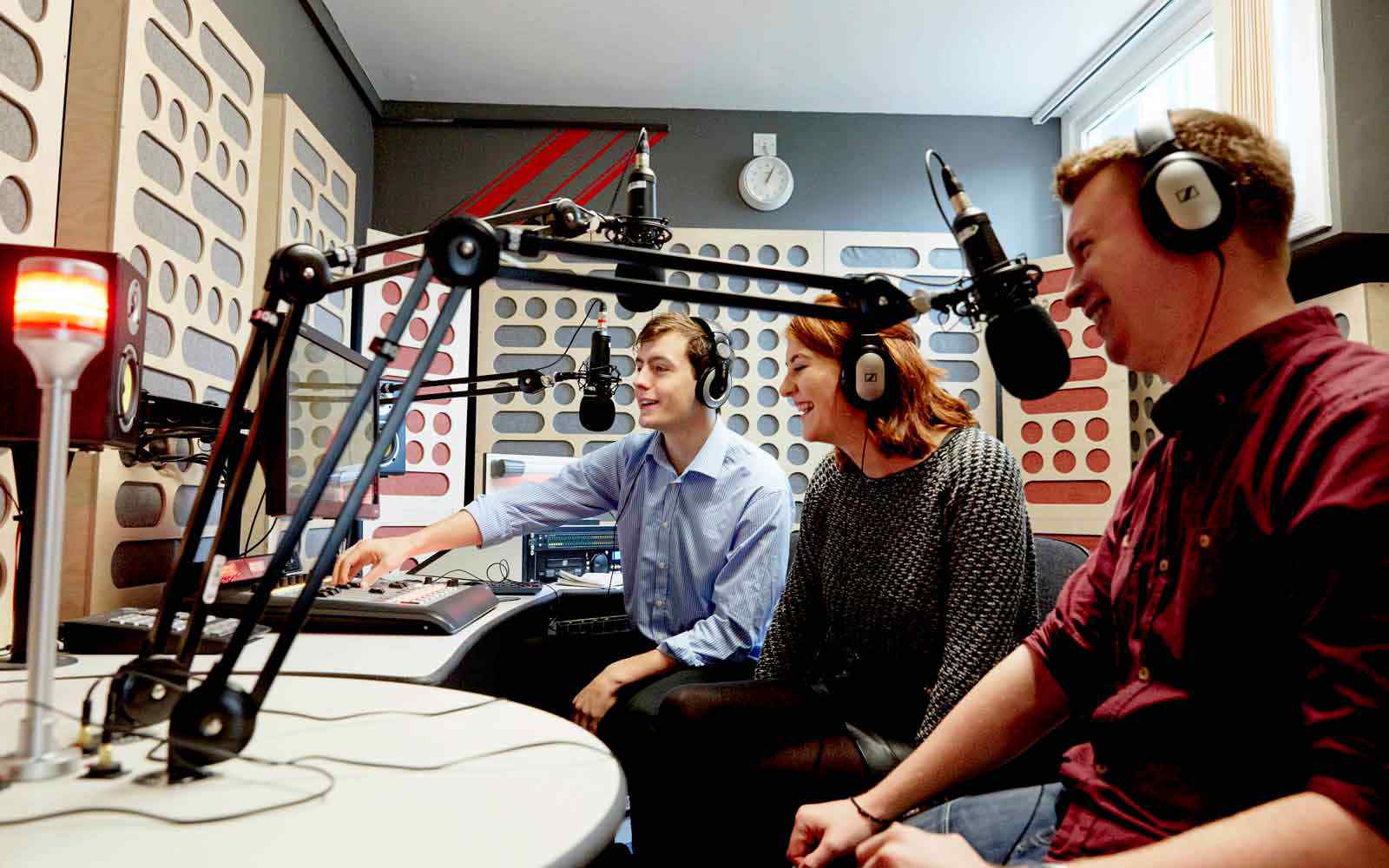
Our Broadcast Journalism Training Council (BJTC) accredited course will teach you to write for any news platform. But you will not stop there. We will encourage you to think about the future of journalism. Considering how the industry may change and evolve, you will learn to adapt to new ways media is consumed. You will learn the digital skills needed to succeed in your career, as well as build an understanding of media law, ethics and public affairs.
York campus
- UCAS code – P3L2
- Duration – 3 years full time, 6 years part time
- Start date – September 2024, September 2025
- School – School of the Arts
Minimum entry requirements
104 UCAS Tariff points
3 GCSEs at grade C/4 (or equivalent) including English Language.
Tuition fees
UK 2024 entry £9,250 per year full time
International 2024 entry £11,500 per year full time
Discover Journalism
Dr Jonathan Brown, Senior Lecturer in Media Production and Journalism introduces us to Journalism at York St John University.
Course overview
This course gives you the knowledge, practical skills and experience you need to succeed as a journalist. You will learn the techniques and tools of the industry by telling the stories you care about, using both traditional and digital platforms. This includes developing your technical abilities by creating:
- TV programmes
- Radio shows
- Podcasts
- Magazines
- Online content
- Websites
You will also have opportunities to take part in live productions and Newsdays, where you will work as a team to create content and turn the material around to deadlines. This is a chance to experience the industry and apply your knowledge.
Alongside this practical learning, we will teach you about the laws, regulations and ethics that relate to media and journalism. You will also explore the history and theory of media. This knowledge will help you blend theory with practice and become a better journalist.
As part of the course you will complete 15 days of media work experience. This will help you to apply your learning and build a professional network of contacts. Other opportunities to gain industry experience include:
- Writing for The Yorkie, our news website
- Getting involved with our Students' Union radio station
- Working with digital media agency, York Mix, to publish your stories online
- Working on live projects with external clients such as BBC Radio and Aesthetica magazine
Throughout your study you will have access to our dedicated newsroom, TV and radio studios, specialist software, and editing suites. We also have cameras and sound equipment for location recording available for you to use. We will make sure you have all the equipment and training you need to tell the stories that matter to you.
Course structure
Year 1
Our academic year is split into 2 semesters. How many modules you study each semester will depend on whether you are a full time or part time student.
In your first year, if you are a full time student, you will study:
- 3 compulsory modules in semester 1
- 3 compulsory modules in semester 2
If you are a part time student, the modules above will be split over 2 years.
You can find out which modules are available in each semester on the Course Specifications.
Modules
Credits: 20
Compulsory module
This module provides an introduction to news gathering, reporting, and news and feature writing. Through this you will explore the principles of professional journalism, learning about the context and constraints that can affect a journalist’s search for original, accurate, legally-sound and ethically sourced material. Some of the topics we will cover include:
- What is news?
- Sources of news
- Different forms of journalistic writing
- Ethics and media law
- Developing contacts
Credits: 20
Compulsory module
Storytelling is key to journalism, and on this module you will explore storytelling techniques, mainly in video and audio mediums. The skills you develop on this module will include:
- Single camera operation
- Video editing
- Audio recording and editing
- Interviewing
- Studio production
- Ofcom code
You will also receive voice and presentation training to professional industry standards.
Credits: 20
Compulsory module
On this module you will develop your research and academic skills. Working with visiting professionals, you will begin in depth research into an area that interests you. This research will be framed around the differences between regional, national and international industries. While investigating your chosen topic, you will also interrogate the issues surrounding media theory and practice.
Credits: 20
Compulsory module
On this module you will explore some of the contemporary debates and issues which impact media production today. We will consider the cultural, economic and political power of media, and what this means for both producers and audiences. Through this module you will further develop your study skills, including:
- Research methods
- Essay writing
- Theoretical and historical modes of study
- Referencing skills
- Sourcing and using evidence
This enquiry-based, interactive style of learning will help to build your knowledge and confidence in your writing, preparing you for the more independent study you will need to carry out later in the course.
Credits: 20
Compulsory module
During this module you will produce news and sport stories for our online platform, The Yorkie. This is a great opportunity to present your work for public consumption. You will explore new writing and learn to develop interactive content for online delivery. Getting the right message to the right person at the right time is vital for media success. With this in mind, you will consider how to promote your work to an audience. Areas covered in this module include:
- Leveraging content through social media
- Developing online news and sports brands
- Timeliness, accuracy and readability in online news delivery
- Meeting the needs of live audiences
- Search engine optimisation
- Audience analytics
Credits: 20
Compulsory module
A knowledge of the laws surrounding media production is essential for a successful journalist or producer. On this module you will delve into different areas of legal requirements and restrictions, such as:
- Court reporting
- Defamation
- Privacy
- Anonymity
- Ethics
- Ofcom code
As part of this module, you will observe live legal proceedings at courtrooms in York, witnessing trials and other hearings.
Year 2
In your second year, if you are a full time student, you will study:
- 2 compulsory modules in semester 1
- 2 compulsory modules and 1 optional module in semester 2
If you are a part time student, the modules above will be split over 2 years.
You can find out which modules are available in each semester on the Course Specifications.
Optional modules will run if they receive enough interest. It is not guaranteed that all modules will run every year.
Modules
Credits: 40
Compulsory module
On this module you will develop your knowledge of radio news and audio features, creating your own audio programmes and running them over a series of newsdays. Working in a simulated professional environment, you will start your journey towards becoming an independent media practitioner. Time management, operating to a deadline, and audio production are key skills to have in the media industries.
Credits: 20
Optional module
This module provides an introduction to the world of magazine creation, curation and publication. You will explore core concepts of production and design, learning to produce magazine content that attracts and engages audiences. When putting together materials, you will consider the specific target audiences for your project and carry out market research to help you content tailored for them. For your assessment you will produce an original magazine, as well as undertaking market research to support your brand.
Credits: 20
Optional module
Understanding the industry and practices of PR and Communications is essential for journalistic success. On this module you will work on a real PR campaign to promote your own media project. You work will be influenced by investigations into the following key concepts:
- Media relationships
- Digital and social media management
- Issues and crisis management
- Events management
- Internal communications
At the end of the module you will submit a portfolio of work for assessment.
Credits: 40
Compulsory module
Using the production skills you gained in semester 1, you will create and produce your own newsday content for multimedia platforms. This will involve identifying and researching topics of interest, collaborating with internal stakeholders, and making sure that all content is delivered on time. Your focus on this module will be on delivering stories that engage on both audio and visual levels.
Credits: 20
Compulsory module
Journalists have a responsibility to find stories and create content that is relevant to the most important issues in society. Their roles allow for them to hold public figures to account and investigate the facts of a story from fiction and exaggeration. On this module you will produce stories from reliable sources and make sure that your reporting is in line with the ethical and moral standards of legitimate journalism. The stories can cover any number of topics, including:
- Local council meetings
- War and terrorism
- Government and monarchy
- The National Health Service
Year 3
In your third year, if you are a full time student, you will study:
- 2 compulsory modules across semesters 1 and 2
- 2 compulsory modules in semester 1
- 1 compulsory module in semester 2
If you are a part time student, the modules above will be split over 2 years.
You can find out which modules are available in each semester on the Course Specifications.
Modules
Credits: 20
Compulsory module
This module is an opportunity to gain vital experience in a professional sports journalism or media setting. Supported by your tutors, you will spend 200 hours working in a professional media environment. During this time you will contribute to the creation, publication and execution of media outputs for live audiences, as well as building your professional network. Alongside your placement, you will attend seminars and workshops hosted by a range of industry professionals.
Credits: 40
Compulsory module
This is a year long module on which you will work under the conditions of a professional newsroom. With your supervisor acting as Editor-in-Chief, you will run newsdays, finding stories and covering them. All of the work you produce will meet legal and ethical standards across multimedia platforms. The content you will create includes:
- A TV or audio news package
- Presentation of a TV or radio magazine programme
- A series of multimedia website articles
Completion of this module is essential for you to gain your Broadcast Journalism Teaching Council accreditation.
Credits: 20
Compulsory module
On this module you will develop your own research project on a media topic you are passionate about. This could relate to your career aspirations, your practical work, or a theoretical concept. We will teach you about research methods and ethics so that you can apply ethical research methods to your work. You can choose to write a traditional dissertation or a piece of practice-led work. Alternatively, you could produce a piece of critical media and write a short thesis to support it.
Credits: 40
Compulsory module
On this module you will bring together the knowledge and skills you have developed throughout your degree to produce a substantial piece of sports journalism. This could be in the form of a documentary, a series of written features, or a magazine. You will present a project proposal to your supervisor which will include an explanation of the idea, target audience and budgets, plans for distribution, and marketing materials. You will then plan and produce the media artefact, working either individually or as part of a team.
Credits: 20
Compulsory module
This module will to help you prepare for your career beyond graduation. We will encourage you to reflect on the experiences you have had on your degree, highlight your successes, and identify any areas for development. This includes creating an online portfolio of your journalistic work that showcases your skills to future employers. As part of the module you will also take part in CV workshops and careers events, and receive 2 hours of voice and presentation coaching.
Teaching and assessment
Teaching and learning
The best way to learn a subject like journalism is by doing it. We will deliver your modules through:
- Seminars
- Workshops
- Technical demonstrations
- Lectures
Each module has 2 to 3 hours of contact time a week. We schedule our taught sessions between 9.00am and 8.00pm, Monday to Friday.
You will also need to conduct independent study outside of this time. This might include reading, researching and completing your assignments. You can also arrange academic tutorials with your module tutors throughout the year to receive feedback on your work and discuss the course content.
Our teaching draws on both our research and professional experience. This means your learning is informed by the most current thinking in the subject area. You can find out more about our research and backgrounds by visiting our staff pages.
Assessment
Assessment types are usually based on practical coursework and vary from module to module. Some of your assessments might include:
- Portfolios of practical work
- Essays
- Presentations
- 1 exam on media law
For each assessment you will have the chance to talk to a tutor about your work before submission. Each assessment will be marked and returned with feedback so you can improve your work.
Career outcomes
Your future with a degree in Journalism
On this course you will gain the skills you need to succeed in a career as a journalist. You will develop your research, interview and reporting skills as well as your knowledge of digital media. Skills such as communication, critical analysis and an ability to work to deadlines are in high demand in a range of careers.
This degree could be the first step toward your career as a:
- Digital copywriter
- Editorial assistant
- Magazine features editor
- Newspaper journalist
- Press sub-editor
- Web content manager
Discover more career options on Prospects careers advice pages.
You could also progress onto a postgraduate degree and take your learning even further.
Postgraduate degrees at York St John University
PGCE at York St John University
Further your education and work towards a rewarding career in teaching by studying for a Postgraduate Certificate in Education (PGCE) after you graduate. For over 180 years, we have worked with enthusiastic individuals who want to shape the future of young people across both primary and secondary school settings. You'll spend a lot of time in schools, developing your practice by teaching. You will graduate with Qualified Teacher Status and become part of the well respected alumni of York St John educators.
Whatever your ambitions, we can help you get there.
Our careers service, LaunchPad provides career support tailored to your ambitions. Through this service you can access:
- Employer events
- LinkedIn, CV and cover letter sessions
- Workshops on application writing and interview skills
- Work experience and volunteering opportunities
- Personalised career advice
This support doesn't end when you graduate. You can access our expert career advice for the rest of your life. We will help you gain experience and confidence to succeed.
Entry requirements
Qualifications
Minimum entry requirements
104 UCAS Tariff points
3 GCSEs at grade C/4 (or equivalent) including English Language.
Calculate your UCAS Tariff points
Additional requirements
All Journalism/Sports Journalism applicants who meet or exceed our entry requirements and provide a suitable personal statement will receive an offer. These applicants will be then contacted by one of our academics via email for an informal interview virtually. A successful interview can result in the academic recommending an ‘upgrade’ to an offer to unconditional.
International students
If you are an international student you will need to show that your qualifications match our entry requirements.
Information about international qualifications and entry requirements can be found on our International pages.
If English is not your first language you will need to show that you have English Language competence at IELTS level 7.5 (with no skill below 7.5) or equivalent.
Mature Learners Entry Scheme
If you have been out of education for 3 years or more and have a grade C GCSE in English Language or equivalent, you are eligible for our entry scheme for mature learners. It's a scheme that recognises non-traditional entry qualifications and experience for entry onto this course. Information on how to apply can be found on our dedicated page.
Terms and conditions
Our terms and conditions, policies and procedures contain important information about studying at York St John University. You can read them on our Admissions page.
Fees and funding
To study for an undergraduate degree with us, you will need to pay tuition fees for your course. How much you pay depends on whether you live inside the UK, or internationally (outside the UK). Tuition fees may be subject to inflation in future years.
UK 2024 entry
The tuition fee for 2024 entry onto this course is:
- £9,250 per year for full time study
- £6,935 per year for the first 4 years if you study part time
These prices apply to all UK, Jersey, Guernsey and Isle of Man students
You can find out more about funding your degree by visiting our funding opportunities page:
Placement year funding
If you choose to take a placement year, and your course offers it, you can apply for the Tuition Fee and Maintenance Loan for your placement year. How much you are awarded is based on the type of placement being undertaken and whether it is a paid or unpaid placement. The tuition fee for your placement year will be reduced.
Tuition fees
UK 2024 entry £9,250 per year full time
International 2024 entry £11,500 per year full time
International 2024 entry
The tuition fee for 2024 entry to this course is £11,500 per year for full time study.
This price applies to all students living outside the UK.
Due to immigration laws, if you are an international student on a Student Visa, you must study full time. For more information about visa requirements and short-term study visas, please visit the International Visa and Immigration pages.
Find out more about funding your degree:
Additional costs and financial support
There may also be some additional costs to take into account throughout your studies, including the cost of accommodation.
Course-related costs
While studying for your degree, there may be additional costs related to your course. This may include purchasing personal equipment and stationery, books and optional field trips.
Study Abroad
For more information on tuition fee reductions and additional costs for studying abroad, please visit our study abroad pages.
Accommodation and living costs
For detailed information on accommodation and living costs, visit our Accommodation pages.
Financial help and support
Our Funding Advice team are here to help you with your finances throughout your degree. They offer a personal service that can help you with funding your studies and budgeting for living expenses.
For advice on everything from applying for scholarships to finding additional financial support email fundingadvice@yorksj.ac.uk.
Course highlights
Tell important stories
Take a practical approach to your learning. Find and tell stories that matter to you across different online and offline platforms. Become a journalist from the day you join the course.
Unique opportunities
Embrace the opportunity to work on live projects with companies across the city. This is a great way to enhance your journalistic abilities and see your work published online.
Home to your creativity
We give you access to all the equipment you need to explore your creative ideas, including a newsroom, TV and radio studios, dedicated editing suits, cameras, sound equipment and more.
Megan Journalism
I thoroughly enjoyed the hands-on experience on the course. We would run live newsrooms where we would have to source, interview, film and edit a package in one day. This experience mimicked a live environment, having to work as a team to produce a compelling news show. The course also allowed me to explore different aspects of journalism such as print, online, TV and Radio. Exploring the wide range of medias allowed me to gain vast skills which have helped me in my career.
Jamie Journalism
I had always had a passion for Journalism but when I started to research jobs in that field, I realised there was only so much I could do without a degree. I’d been out of education for 3 years and I was pretty nervous to start again but I said to myself that I just need to throw myself into every opportunity I was presented with. Looking back, I know I’ve done that. I’m happy with what I’m doing and what I have done. York St John now feels like a second home.
Molly Journalism
My favourite part of the course was gathering stories and interviewing people for my storytelling module. I have had a real thrill for finding and discovering stories to compile together for my portfolio of the world. I love finding out in depth about a story and piercing it all together to create a finished artefact.
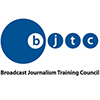
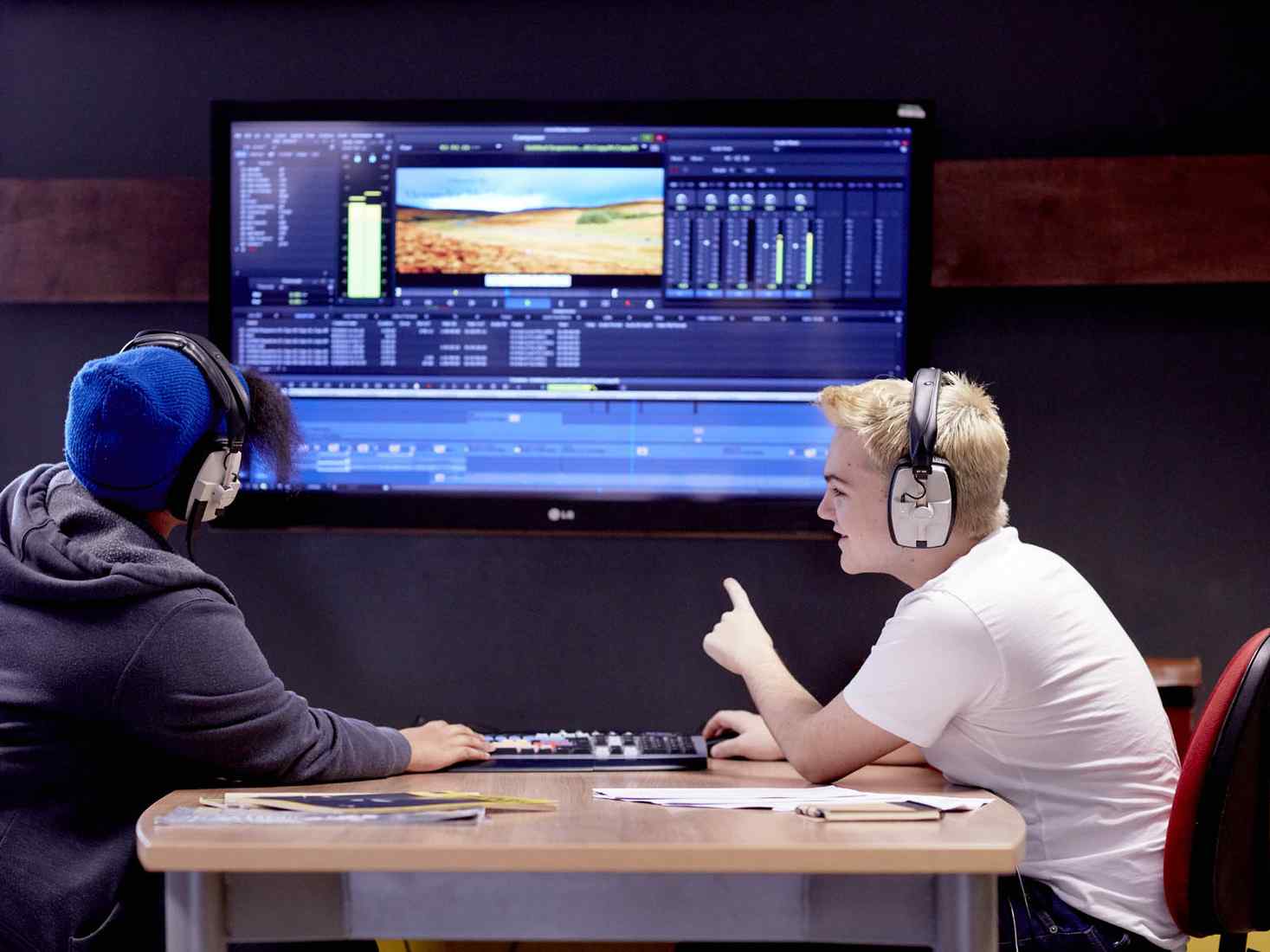
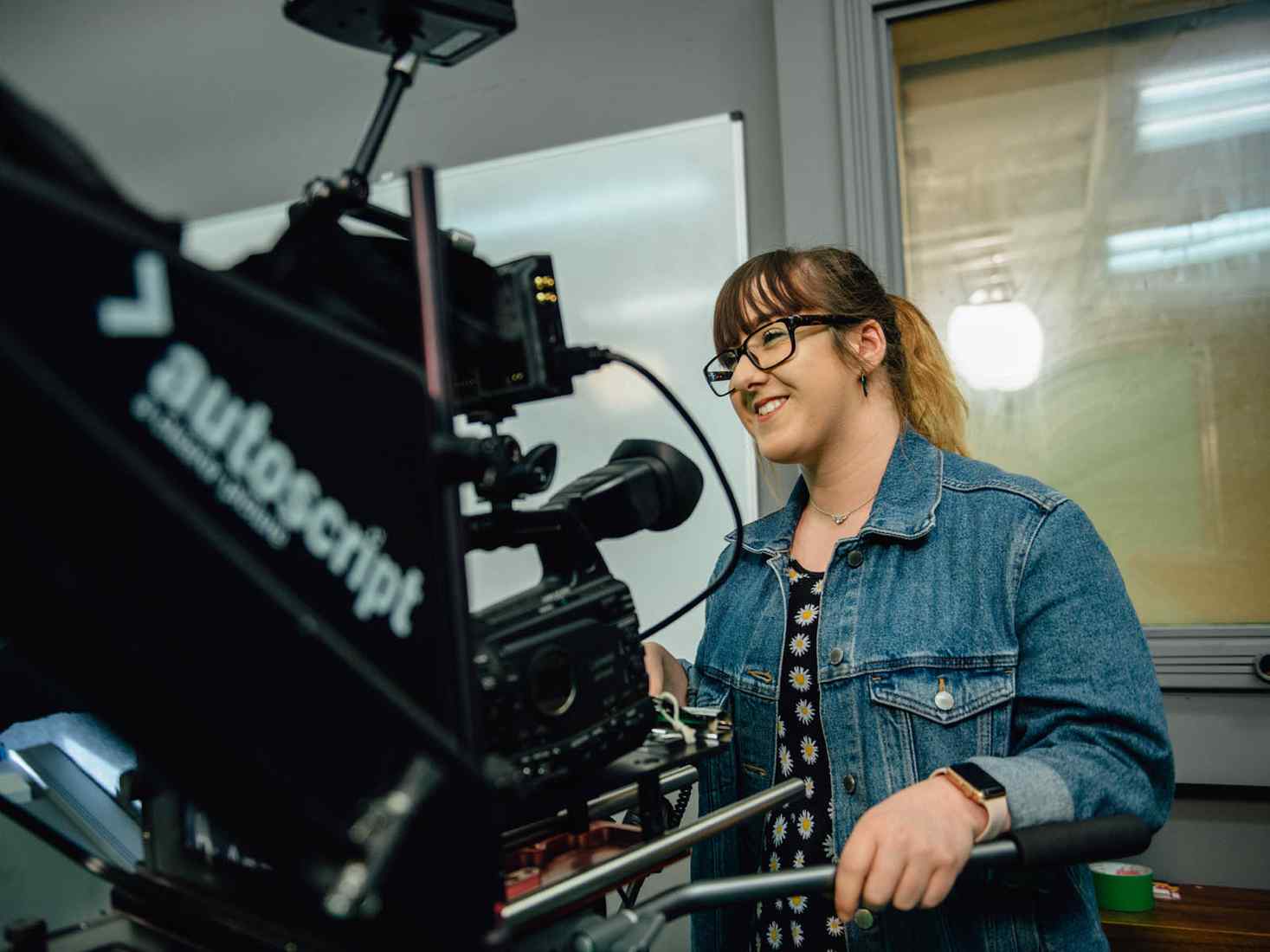
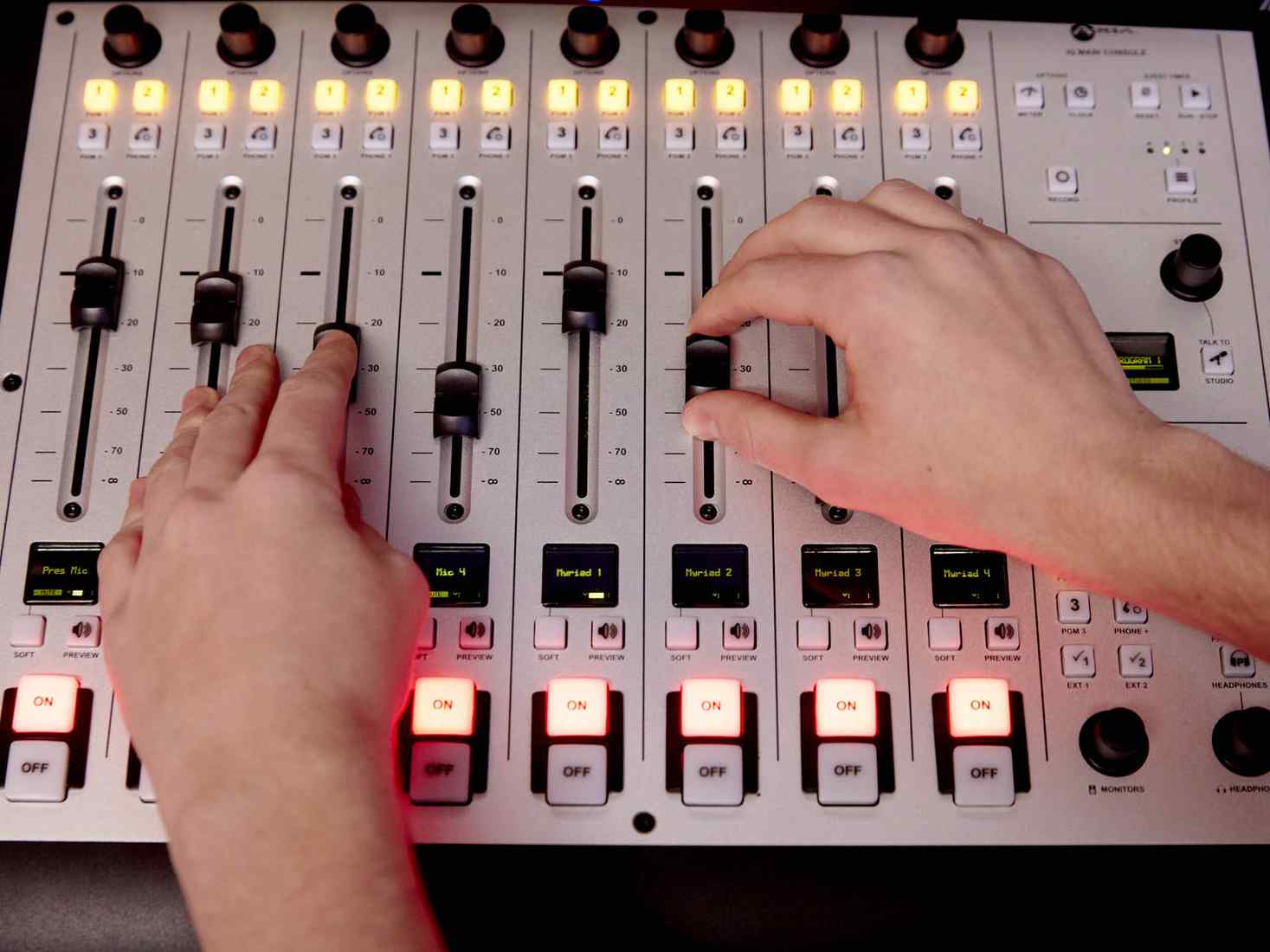
.jpg)
